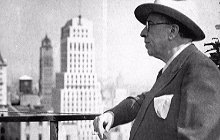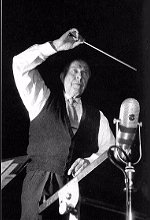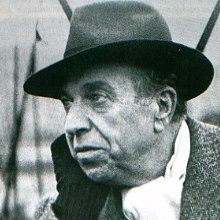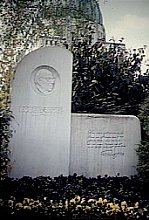| [naar
inhoudsoverzicht muziekgeschiedenis]
[naar
inhoudsoverzicht korte biografieen]
[terug naar inhoud
biografie Stolz]
[naar
literatuurlijst]
inhoud:
|
BIOGRAPHY second part (1933-1975)
In the shadow of the „Third Reich"
- between Berlin and Vienna (1933-1938)
On January 30th 1933, Hitler seized power in Germany and
the persecution of Jews and political dissenters began. Stolz, though „Aryan"
according to the racial laws, loathed the National Socialist terrorism
from the very beginning: „My general rule for the politics, which I have
always observed, is simple: Do not support any braggart and do not trust
anybody who promises you paradise on earth!... My stomach revolted, when
I saw the smashed window-panes and the plundered Jewish stores and heard
the horrid roars when helpless citizens were beaten up."
But Joseph Goebbels, Hitler's mighty Propaganda Minister,
had a conception for the cultural policy, in which Robert Stolz could continue
to play a part: Art and entertainment had to be „unpolitical" and to liven
things up in the population.
At first, the „Third Reich" did not change the course of Stolz'
life. He continued to commute between Berlin and Vienna and to compose
film music. Titles such as „Die Nacht der großen Liebe", „Hochzeit
am Wolfgangsee" and „Frühjahrsparade" did not betray the
tensions and the conflicts of their date of origin. In the Stolz movie
„Herbstmanöver"
(1935) Leo Slezak sang one of the songs, which - like „Im Prater
blühn wieder die Bäume" - entered almost into the folk song
repertoire: „Auf der Heide blühn die letzten Rosen".
But political convictions were not only a lip service for the
composer. Twenty-one times in all, without return and for sympathy, he
smuggled persecuted persons from Germany to Austria in the luggage-boot
of his car - at his own high risk, because in case of emergency the Austrian
nationality would not have been able to protect him. A big swastika on
the hood served as cover, the popularity and the prominent name „Robert
Stolz" and an autograph for the border official were effective.
In 1936, Stolz left Hitler's Germany and returned to Austria.
In London, Fred Astaire was the star of the musical „Rise and
Shine" and the movies „Wer zuletzt küßt" and „Die
Austernlilli" were made. Forty sound films in all were the result of
the years 1930 to 1937.
Emigration and new start (1938-1945)
On the night of March 11th 1938, Stolz heard in his apartment
at Elisabethstraße the radio address of the Austrian federal Chancellor
Dr.
Kurt Schuschnigg. Austria had stopped to exist. Warned by one of his
brothers, a convinced National Socialist, the composer left Austria in
the direction of Zurich still in the same night. He realized soon that
he could and would not return to the „annexed" Austria. This meant indeed
to leave an important fortune behind.
From Zurich he traveled to Paris, where he settled down for the
next two years. The German government and the Reichsmusikkammer (musical
chamber of the Reich) tried several times to prompt him to return. The
ruling powers did not want to do without the magnetism and the popularity
of the name Robert Stolz. If he would not come back, the German copyright
company STAGMA would not look after his rights any longer. Through the
mediatorship and under pressure of the Londoner publisher Boosey, Stolz
succeeded in inducing the STAGMA to release him. The attempted blackmail
was averted.
Internment in France (1939)
Stolz carried on the compositional work with undiminished energy in Paris,
in 1939 he composed the operetta „La montagne bleue", but at the
end of 1939 the composer was hit by a blow, which meant nearly the end
of his life. His wife Lilli - she was by this time his fourth wife - left
him and stole his whole fortune including his „Carte d'identité",
which was as residence permit almost vital at this time. Stolz, a few months
ago still at the height of his creative power and millionaire, had now
become an undesirable alien without money and papers. Therefore, he was
arrested by the French police on November 30th 1939 and took to the internment
camp of Colombe.
In Colombe, where 70,000 people were crowd together in the open
air, Stolz - he was now 59 years old - fell a victim to a pneumonia. He
was saved in the nick of time by a chance acquaintance he made in Paris
in the previous months: A young lady named Yvonne Luise Ulrich had assisted
him in his attempt to come by his fortune stolen by Lilli Stolz. The Parisian
emigrants gave her the nickname „Einzi", because she was the only (einzige)
helper to offer her services. Yvonne Luise Ulrich intervened at French
government agencies and obtained Stolz' release. In the next decades she
was the mate and wife of the composer.
As Austrian ambassador in the USA (1940-1945)

Robert Stolz in New York
In spring 1940, Stolz got to safety to America before the advancing
German armies. On April 1st 1940, he arrived in New York. He did
not speak the language of the host country and he started - together with
his new companion „Einzi" - to build himself a completely new existence.
The first attempts to gain a foothold as composer in the USA were
not much successful. A change occured, when the violinist Jack Fischberg
asked him if he was willing to substitute for Bruno Walter in a
Johann Strauss concert of the New York Philharmonic Orchestra.
Stolz was unknown as conductor in the USA and he had no experience
in conducting symphony orchestras - but he accepted.
The evening „A Night in Vienna" at Carnegie hall met with a
smashing success. Record companies and radio stations commissioned him
now to compose film music, for stage performances and concerts. Einzi had
invited the manager of one of the greatest American concert agencies at
Carnegie hall and so „A Night in Vienna" went on tour through the USA. |
|
|
|

Robert Stolz as conductor |
Even as Robert Stolz had his domicile in Vienna again, this tour belonged
to his fixed performances, the title became almost a brand mark. The second
concert with works by Johann Strauss, Franz Lehár,
Oscar Straus, Emmerich Kálman and Robert Stolz was already
performed at Lewinson stadium and they played to a full house of 20,000
spectators. Other American big cities followed suit and organized also
Robert Stolz concerts in grand style, which had to be repeated already
next year.
Stolz acted not only as musician in the USA, but also as representative
of Austria, which had disappeared from the maps. Eleanor Roosevelt, America's
First Lady, said to him on the occasion of a gala dinner in New York: „Austria
has no ambassador in the USA and nevertheless there is an ambassador in
the United States, and that's you, Mr. Stolz."
The consciousness of this unofficial and still established function
moved the composer to appeal to his Austrian compatriots in a radio address
in 1943. It was a clever appeal to the Austrian mentality and its
contrast to the militancy of the National Socialism: „At the time when
I left my homeland accompanied by the noise of the goosestep, I thought
immediately: We are cut out for something like this. It seemed that they
have put a steel helmet on Mozart, buckled a saber on Schubert
and winded a barbed wire around Johann Strauss' neck..."
By summoning up private sponsors Robert and Einzi Stolz succeeded in
putting on the stage a German language „Fledermaus" in New York in 1942
and made it a success covering the costs - an enterprise, which experts
of the musical scene of New York had labeled as impossible. The „Fledermaus"
was
followed by The „Zigeunerbaron", the „Bettelstudent" and
finally the „Merry Widow".
In Vienna again (1946-1950)

Vienna, 1947
Stolz told about the end of the war in retrospect: „... And then came
spring 1945. I was just conducting my concert „A Night in Vienna",
when we received the news: The war is over! From this moment on, I had
only one single idea - back to Vienna!"
But this return meant to give up the comfortable American living
conditions and to move to a city, which lay in ruins for the most part
and could hardly secure the most elementary necessaries of life. But this
could not divert Stolz from his intention: „I was convinced that Austria
and Germany, if they have ever needed me, needed me more than ever in this
moment. When someone you love is ill, you have to rush to his help. He
needs your assistance much more than when he is healthy. I was convinced
that my music would be able to make a little contribution to the recovery
of Austria and Germany after National Socialism, after war and destruction."
Robert and Einzi Stolz were the first civilian travelers, who
were allowed to fly from the USA to Austria. On October 30th 1946,
they arrived at Vienna international airport. They were given an enthusiastic
reception, the mayor of Vienna was present as well as the Austrian newsreel.
Already before his departure from the USA, Stolz began to work
on a musical comedy, which text was written by Karl Farkas: „Schicksal
mit Musik". The Apollo-Kino was adapted as performance place. But „Schicksal
mit Musik" turned out to be unsuccessful and suffered the same fate
as the stage play „Drei von der Donau" (text by Robert Gilbert).
Welcome was the restitution of the apartment at Elisabethstraße,
where Soviet officers lived till then. The first great honorable distinction
of his late creative period ensued in 1947: The Austrian government
conferred the title of professor to him.
The late years (1950-1975)
On August 25th 1950, Robert Stolz celebrated his seventieth birthday.
What some people might have taken as the end of an artistic life was for
him just a stopover: A creative life period lasting twenty-five years followed
and Stolz retired not at all into private life.
The chronology of the years 1950 to 1970 shows even
in a merely summary list the presence of the composer Robert Stolz in the
Austrian and European musical life. In 1951, the operetta „Der
Tanz ins Glück" was adapted for the screen with Johannes Heesters,
in London the musical „Rainbow Square" and in Vienna the operetta
„Das
Glücksrezept" were performed for the first time. From 1952 on,
Stolz composed every year the music for the „Wiener Eisrevue", which had
a run of 19 productions. In 1953, the arcade court of the town hall of
Vienna was the scene of the first performance of the Singspiel
„Der
liebe Augustin" with Paul Hörbiger. The operetta „Signorina"
was put on the stage in 1954 in Nuremberg. The new star Romy
Schneider dominated in the movie „Die Deutschmeister" of 1955.
It was the third adaptation for the screen of the theme of „Frühjahrsparade".
In 1957, Stolz presented his „March of the United Nations",
in 1958 his film „Im Prater blühn wieder die Bäume",
in 1959 the musical comedy „Kitty und die Weltkonferenz".The
operetta „Trauminsel" was performed for the first time in 1962 in
the course of the festival of Bregenz, Hans Weigel was the librettist of
the musical comedy „Ein schöner Herbst" of 1963 and in 1965
Stolz was the conductor of the New Year's Eve performance of the „Fledermaus"
at the opera house of Vienna. In 1967, Stolz was in the center of
the centenary of Strauss' waltz „An der schönen blauen Donau". In
1969,
a new première was performed at the sea stage of Bregenz:
„Hochzeit
am Bodensee".
The ninetieth birthday of the composer occasioned celebrations, honors
and a great television gala night with the still hale and hearty Robert
Stolz.

The tomb of honor
at the central cemetery |
The news of Stolz' death on June 27th 1975 spread around the
whole world. Not only innumerable friends and fans of the composer sent
letters of condolence, but also leading figures of the politics, the economy
and the culture, heads of governments and the states. The obsequies in
Vienna were a state ceremony: Stolz lay in state at the foyer of the opera
house of Vienna. Thousands of people took leave at his coffin. On all Austrian
office buildings the flags were half-masted. His tomb of honor at the central
cemetery of Vienna neighbors on the tombs of the great Austrian musicians,
which personal acquaintance Stolz made in his youth: Johannes Brahms
and Johann Strauss. |
|



